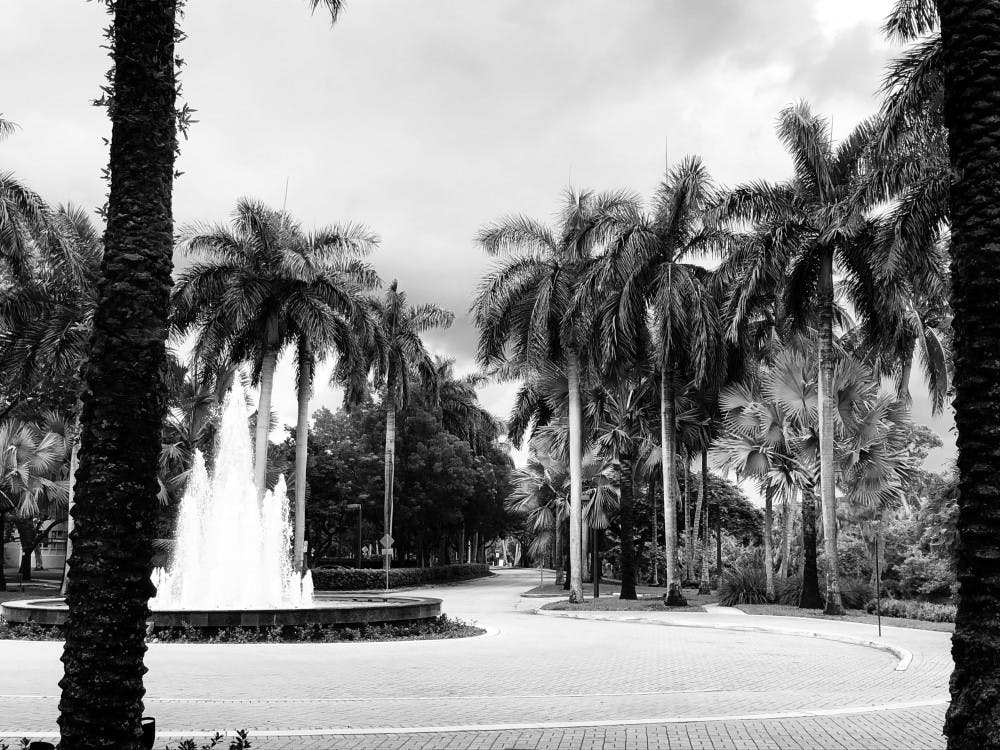DISPATCH
MIAMI, FLORIDA | July 29, 2019
Before my Miami-based internship this summer, I first encountered the city metaphysically, through cinema: Barry Jenkins’s “Moonlight” (2016) introduced me to a Miami beyond the sensory stimulation of seductive palm trees, shiny cocaine, ritzy beachfronts, Pitbull music videos, and easy, consequence-less hedonism.
The film does not simply take place in Miami, but is consciously about Miami — about the interior lives of the Miamians who don’t chug refined cocktails at LIV, about the city’s economic dispossession and racialized subjugation, about the noxious homophobia and sadistically masculine expectations that plague the lives of the city’s most existentially vulnerable.
The film documents the experiences of Chiron, who is black, poor, gay, bullied nearly to death, fatherless, neglected by his crack-addicted mother, and suffocated by insular material and relational deprivation. I found very little hope in “Moonlight.” It’s a sobering American tragedy and a haunting exhibition of forgotten lives on the brink of social destruction, of people at the end of the line and ready to give in. There are times when, as a viewer, you just have to look away — the film is too grisly to be enjoyed, much like the Miami “Moonlight” portrays.
Yet one scene undercuts this grueling tenor. One night on a quiet beach removed from Miami’s nervous energy, a teenage Chiron and his love interest, Kevin, have an erotic encounter. Sitting aside each other glancing at the ocean, the boys begin kissing, and Kevin delicately masturbates Chiron to orgasm. As he approaches climax, Chiron clutches the darkened, cooled Miami sand, gripping a momentary escape from socialized trauma and repression.
Chiron’s short-lived ecstasy embodies the inexact, potent longings of Miami, a restless city craving a de-numbing from the anguish of quotidian life.
I felt a comparable sort of longing in the weeks prior to my arrival to Miami. I told my friends that this summer I was going to expose myself to the social elements. I was going to venture out into the world and have experiences worthy of remembrance, experiences that would make me reconsider my generally ordinary existence. I’m not Chiron — my life and his are essentially and systematically disconnected — but, upon entering Miami, I yearned for a reprieve from a wanting loneliness that he and countless other native Miamians have endured.
Part of this Miamian longing is structurally embedded, as the city’s urban landscape is terribly disjointed: Miami’s public transit system is limited, and its neighborhoods feel sprawling yet effortfully secluded — physically, socially, and institutionally — from one another.
My internship took place at the University of Miami, whose stunning campus resides in Coral Gables, an upper-class suburban enclave; for lodging, I lived in the dorms. The Gables, to use the location’s pretentious nickname, is a prime example of the city’s troubling design — the town is as stunningly beautiful as it is culturally and economically insular. I tried not to take for granted how privileged I was to have spent the summer in a safe, well-endowed, and generally welcoming neighborhood.
Despite, or perhaps irrespective of, the town’s saturation of wealth, the residents of the Gables have been nothing but hospitable and kind to me, a clueless college kid from the North. In the same way, I found revitalizing hope in my internship, a PICS position in which I served as a teaching fellow for a head-start education program for high-achieving Miami students from under-resourced backgrounds. The wholehearted passion of the program’s administrators and the intense brilliance of my students evidenced the city’s radiant profundity.
But still, I was frustrated by my frequent lack of proximity to what I conceived as Miami at its rawest — the Miami where the party’s at, the Miami where the living happens.

Occasionally, I escaped the Gables and experienced metaphorical (and actual) parties. I spent a Saturday at Miami Beach and another at Key West; I unashamedly indulged in mouthwatering Cuban cuisine (if you’re a foodie, you should immediately report to Miami); I spent a Friday evening with my lovely colleagues at the bustling Sunset Place; one night, after other plans unraveled, I watched the traumatizing and mesmerizing “Midsommar” at a comfy movie theater with friends; I had a vulnerable conversation with a disarmingly sociable Lyft driver on my way home from an awkward Tinder date; and I celebrated a dorm mate’s birthday party at a pulsing, deafening Latin nightclub in West Miami.
Yet, of course, lingering beneath these revelatory experiences has been the anticipation of departure from not only Miami but also from the city’s people, some of whom I now consider close friends; in a few days, after eight weeks here, my internship will wrap up, and I will take a flight back to New York, where I’ll remain before returning to Princeton.
Despite my long-term singledom, my experience in Miami has felt like a fated, doomed summer love affair, a tragedy as mundane as it is cataclysmic. A heady dissonance parallels an infatuation with people and places I’ll leave all too soon and likely never see again. It’s like having sex with someone for the last time: we sometimes feel the closest to our lovers in the moments right before we lose them for eternity.
Perhaps, then, we find — and lose — the intimacy we’re looking for in the places in which we live on borrowed time, in the places where we know we can’t stay.
Editor’s Note: The Prospect is thrilled to debut a new series, “Dispatches,” in which ‘Prince’ staffers reflect on their travel and work experiences over the summer. Whether close to campus or across the globe, our staff are gaining new perspectives and insights, and we are delighted to share some of them with you.









